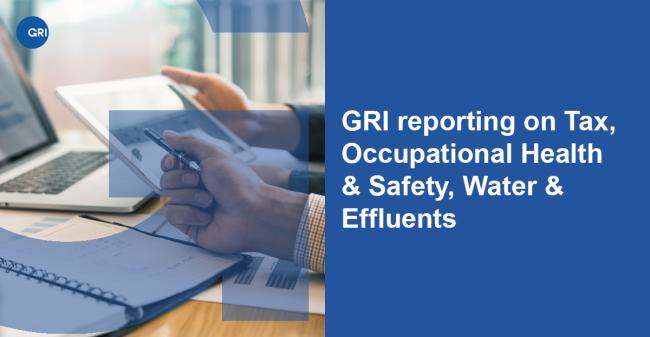Three GRI Standards Come Into Effect for Sustainability Reports in 2021
Published on by Water Network Research, Official research team of The Water Network in Government
New topic Standards on Tax, OHS and Water to be used
Companies disclosing their impacts through the #GRI standards - the world's most widely used for sustainability reporting - are to follow new topic Standards from this year onward, covering Tax, Occupational Health & Safety, Water & Effluents https://bit.ly/39svHMk
Companies disclosing their impacts through the world’s most widely used sustainability reporting standards are to adhere to three new and updated standards, for reports they publish from this year onward.
In 2018, two revised GRI Standards launched – for occupational health and safety, and water and effluents. In December 2019, the first global standard for tax transparency published. Effective from 1 January, companies identifying any of these topics as material are now to apply the new Standards.
Responding to the information needs of investors, civil society, labor organizations and others, GRI 207 enables companies to report country-by-country tax payments alongside their management approach to tax. The Standard supports transparency on the tax contribution companies make to the economies in which they operate.
GRI 403: Occupational Health and Safety 2018
This updated Standard addresses reporting on occupational health and safety management, including prevention of harm and promotion of health at work. With a central focus on the safety and wellbeing of employees, the OHS Standard is highly relevant as companies respond to the changed circumstances of the COVID-19 pandemic.
GRI 303: Water and Effluents 2018
GRI 303 provides a holistic perspective on the impact organizations have on water resources. The updated Standard considers how water is managed, inclusive of impacts on local communities, and gives a full picture of water usage, from withdrawal to consumption and discharge.
Bastian Buck, GRI Chief of Standards, said:
“These three GRI Standards now in effect will be applicable to many organizations around the world, helping them respond to the emerging demands of their stakeholders. From tax transparency to employee wellbeing and water stewardship, they cover crucial issues that illuminate corporate contributions to sustainable development.
“The GRI Standards seek to enable companies to communicate the full range of their impacts on the economy, the environment and society. That is why they are regularly reviewed, with content updated and the addition of new topics considered.
Looking ahead, we are not standing still. This year will see the launch of a major update to the universal Standards – the disclosures at the heart of all reporting through GRI – as well as progress on the new Sector Program. This continuous development helps us deliver Standards that reflect the global best practice in sustainability reporting.”
GRI’s services includes the Management Approach Disclosure Service, which assists companies in reporting on their material topics. The OHS training course, available via the GRI Academy, covers the key features of GRI 403 and the latest OHS disclosure trends.
For more information on meeting the effective dates for new or revised Standards, view the FAQ on writing a report in accordance with the GRI Standards.
GRI 306: Waste 2020, which published in May last year, comes into effect from 1 January 2022. Early adoption by reporting organizations is encouraged.
The development of the GRI Standards, which are provided as a free public good, follows a multi-stakeholder process overseen by the Global Sustainability Standards Board, the independent body within GRI’s governance with sole responsibility for standard setting.
Global Reporting Initiative (GRI) is the independent, international organization that helps businesses and other organizations take responsibility for their impacts, by providing them with the global common language to report those impacts.
Taxonomy
- Compliance
- Environmental Compliance
- Sustainability Management
- Compliance
- Tax
